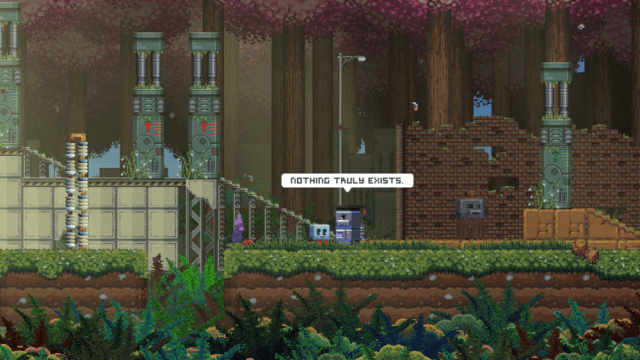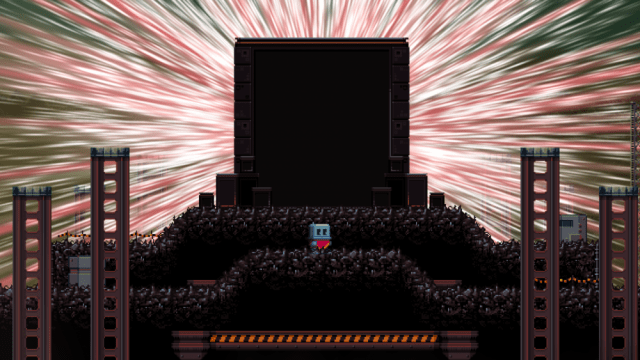A Post-Apocalyptic Robot With Thin Layers
There is no shortage of puzzle-platformers on the downloadable scene, each one with their own retro hook, so standing out from the rest of the scenery can be a daunting task. With one simple push of a button, however, the mechanized titular protagonist of Poncho, just released for the Wii U, can change his position within the pixellated, parallaxing world. Is this clever gameplay mechanic enough to bring himself (and hopefully his game) to the indie foreground?
Game Name: Poncho
Platform(s): Wii U (reviewed), PS4, PC – Steam
Publisher(s): Rising Star Games
Developer(s): Delve Interactive
Release Date: August 18, 2016
Price: $9.99
Copy provided by publisher
Though the central concept at the heart of Poncho, playfully tinkering with 2D depth and granting the ability to leap between background and fore, is solidly creative and at times quite satisfying, in the end the game doesn’t seem to know how to fully utilize the nifty tools at its disposal, ultimately just going through the motions, and much like the post-apocalyptic automaton population that peacefully roam the landscape, lacking the spark of life.

At its best, Poncho is comprised of basic running and jumping, with a twist: Poncho is not relegated to one plane. Whatever platforms can be seen scrolling by either behind or in front of him are reachable by warping to them. What this does is allow for making one’s way through a stage to become a sort of rudimentary puzzle with several paths, as obstacles that would normally block a player off in other 2D games can be easily circumvented simply by teleporting to that stretch of ground behind it. Can’t cross a large gap? Simply pop into the background, walk along until Poncho is lined up with the space you want to reach, then pop forward again and continue on your merry way. Momentum carries over during this switch, so eventually navigation becomes a ballet of timed leaps and perspective shifts that requires some skill.
It’s a fun wrinkle that shows a lot of promise early on, but unfortunately Poncho‘s design rarely takes advantage of the potential. Instead of carefully crafted levels that require increasing thought and imagination to progress, the same sorts of hurdles are repeatedly encountered and eventually easily overcome. Whether blocks that rhythmically shift between planes or stone walls that slide when activated, every platforming idea players will see is used up within the first few levels, leaving the rest of the game feeling like filler when it should feel like adventure.

Reaching the twin pillars that signify the end of a stage is never difficult, so what else does Poncho have to offer? Unfortunately not much. A few random collectibles are haphazardly placed that can be used to buy keys, which are also sparsely scattered about, but being mostly unnecessary to finishing the game or unlocking anything special, they provide little incentive toward pursuing them, especially when placed in frustrating areas that are not worth the price. Also present are some new abilities, but finding them delivers little impact to the overall experience. In fact, I had easily beaten the game before discovering any of them, mitigating their contribution to the point where it didn’t really even matter. Ditto the optional side quest of reviving dead robots. Those obsessed with completion may be compelled to do this out of OCD, but no other real motivation exists.
Low Thread Count Still Provides Some Comfort
Due to an underdeveloped world and lack of ideas, much of Poncho feels as if it were the basis for an unfinished game. With no enemies to be defeated and no goals to be reached, Poncho becomes all about the aforementioned level design. But while that doesn’t quite rise to the occasion, there’s no denying that the pleasure of zipping your little robot buddy back and forth is a satisfying one, perhaps deserving a better game, but pleasurable nonetheless. Contributing to the goodwill is Poncho‘s visuals, gorgeous 16-bit-ish pixellated visuals, at times painterly in their simple beauty. Colorfully vibrant, the lush forests, dark cavern, and final industrial tower pop off the screen. Though sometimes repetitive with the limited slowdown, they never get any less pleasing to look at, especially during well-constructed occasional story moments that provide some truly stimulating imagery.
The sights, sounds, and controls establishes an overall enjoyable vibe that nearly makes up for Poncho‘s shortcomings, and though the end-of-the-world scenario has been played out for decades, it still had me engaged enough to want to see where it was going. The story could never be called fully fleshed-out, but it presents the situation with just the right amount of ambiguity through the miscellaneous bleep-bloop gurglings of fellow droids that the payoff works well enough, cookie-cutter though it is.
A Matter of (Fashion) Taste
Those looking for a different kind of retro experience could do worse than Poncho, but they could also do a lot better. While its uninspired level design and lack of meaningful activity certainly makes for a short jaunt for those brought up on precision jumping, a clever mechanic and a charming ambiance does show the sort of promise that can be rewarding. Unlike the piece of tattered cloth draped around his metal shoulders that separates him from the naked robots, it’s not enough to make Poncho’s adventure stand out from the increasingly busy indie scene, but those who spot Poncho might see layers of potential in a side-scroller that seeks a different perspective.
Summary
Though shallow in its execution, the plane-switching mechanics of Poncho contain enough cleverness to prove intriguing. With a pleasingly melancholy atmosphere and beautiful pixellated visuals, the titular robot seems destined for a truly memorable side-scrolling puzzle platformer. Unfortunately, this is not it.
Pros:
- Satisfying mechanic that plays on parallax scrolling
- Rich, 16-bit visuals
Cons:
- Repetitive, uninspired level design that does not exploit the concept
- Empty, lifeless stages with very little to do
- Short, relatively easy for experienced players
-
Poncho ultimately lacks depth, but show promise


